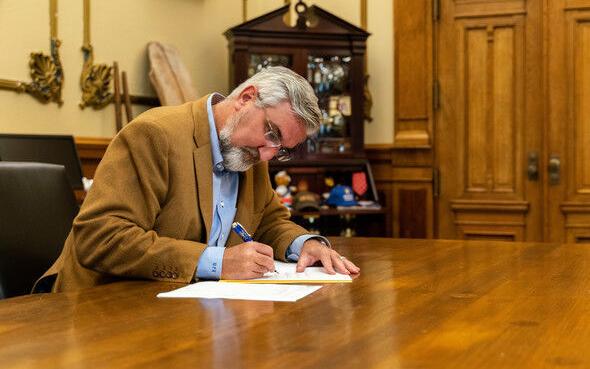Governor Signs Over 100 Bills From 2022 Session into Law—And Vetoes Two
INDIANAPOLIS—Gov. Eric Holcomb has signed over 100 bills into law this month while vetoing two.
Only bills that receive majority approval in both the Senate and the House make it to the governor’s desk. Once the bills pass through the Statehouse, they are known as either Senate enrolled acts or House enrolled acts, and the governor has three possible courses of action he can take. He can sign them into law, veto them or do nothing. If he does nothing, acts automatically become law on the eighth day after receipt.
This year, Holcomb flexed his gubernatorial authority by killing two bills, including House Enrolled Act 1041, which would have banned transgender girls from participating in girls’ sports in schools. He is the exception among Republican governors across the nation who let similar legislation take effect.
In a letter to Speaker of the House Todd Huston to explain his veto, Holcomb wrote the bill had “too many unanswered questions.â€
Holcomb didn’t like how students at different schools or in different counties would have been treated differently under the law, adding that it wasn’t clear how the state would maintain consistency in excluding transgender girls from girls’ sports.
The needs of female athletes are currently being met, Holcomb continued, especially since not one individual assigned male gender at birth has navigated through the Indiana High School Athletic Association’s approval process for transgender girls who want to compete in girls’ sports.
“It implies that the goals of consistency and fairness in competitive female sports are not currently being met. After a thorough review, I find no evidence to support either claim even if I support the overall goal,†Holcomb said.
Finally, Holcomb also said he didn’t want the state to face a lawsuit like other states that have passed similar legislation. Tennessee and Florida are both facing lawsuits, and Holcomb said there is an indication that laws of this nature won’t stand up in the courtroom because they do not ensure protection under the law as guaranteed by the 14th Amendment.
Holcomb also rejected House Enrolled Act 1211, which would have called on the state government to explore the use of blockchain technology to increase efficiency. Blockchain systems promote the seamless flow of data across networks and computers. They are often used to track financial assets and monetary transactions.
In another letter to Huston, Holcomb objected to new and “unvetted†language that legislators added to the bill on the last day of the session. He said there should have been a chance for concerned parties to review and testify.
He vetoed the bill because it would slow counties’ ability to use the $154 million that Indiana counties plan to employ under the Regional Economic Acceleration and Development Initiative. The READI grant program offers a total sum of $500 million for towns, cities and counties to attract workforce talent and make strategic workforce investments. Holcomb asked legislators to review these concerns and craft a revised bill.
Yet, the bulk of lawmakers’ bills earned Holcomb’s approval.
Most notably, Holcomb signed House Enrolled Act 1296 Monday, one day before the deadline. The law repeals the requirement that Hoosiers obtain a permit to carry a handgun. Permits are not required in 15 other states, but most of those states require that gun owners obtain a permit to conceal their weapons.
In a press release, Holcomb explained his signature.
“The Second Amendment has been debated for years, yet time and again our U.S. Supreme Court has reaffirmed this important constitutional right that I fully support,†Holcomb said. “HEA 1296, which I’ve signed today, entrusts Hoosiers who can lawfully carry a handgun to responsibly do so within our State.â€
In the same release, Indiana State Police Superintendent Doug Carter said the law will change police practices, but he hopes that people will still obtain a permit of their own volition.
“I will work with law enforcement leaders across our state to make necessary changes to firearms enforcement as well as finding the best way to identify individuals who are not allowed to carry a firearm as defined by Indiana statute,†Carter said. “We will continue to encourage citizens to apply for, and maintain, firearms permit. A permit will assist law enforcement officers and will also allow a permit holder reciprocity with other states.â€
A full list of the bills that reached the governor’s desk can be viewed on the 2022 bill watch located on the state website, IN.gov.
The legislature will have the chance to override the governor’s vetoes with majority votes in both chambers, which they did a few times last year.
FOOTNOTE: MIsaac Gleitz is a reporter for TheStatehouseFile.com, a news website powered by Franklin College journalism students.





